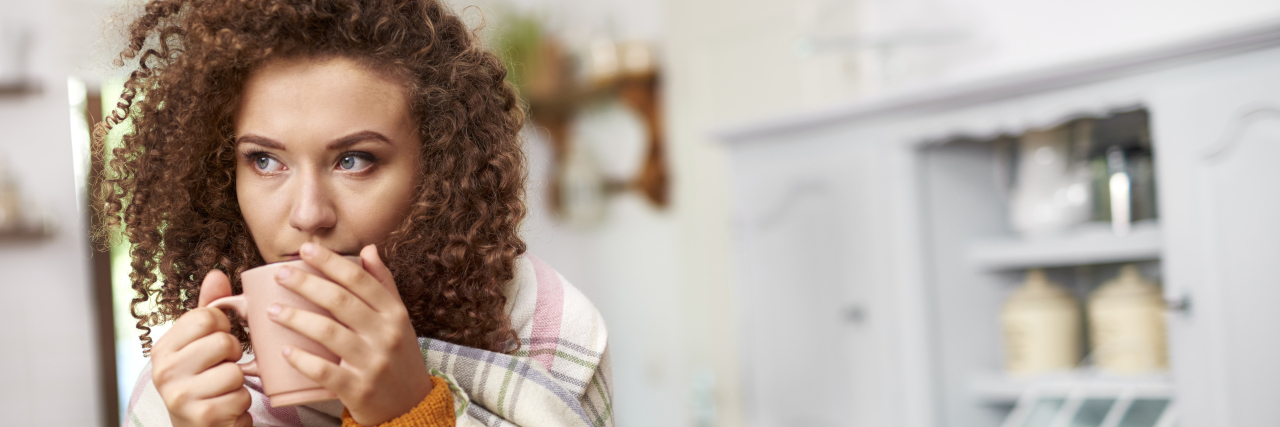How Life Has (and Hasn't) Changed as a Chronically Ill Person During the COVID-19 Pandemic
Only a week ago, I was planning a rare visit to a friend after a long winter spent in hibernation, hiding from the cold and battling various winter bugs. I was ready to tidy myself up and poke my head out into the sunlight to see the spring lambs leaping and the daffodils coming up. But with the news of the global fast-spreading pandemic, suddenly everything changed. Or at least it did for the rest of the world.
Work, travel and socializing have been reduced or stopped altogether because of the coronavirus. People are isolated in their own homes as a result of mass self-isolation. My life, on the other hand, has hardly changed at all. All I’ve done is withdraw to my warm burrow when I realized it was not safe to come out yet. My world is already a lot smaller than most people’s and fear of the unknown always lurks in the background. Let me explain.
Fear of Death or Sickness
When the President of France declared we are in a health “war,” it sounded uncannily familiar to me. As someone with a chronic, fluctuating illness and weakened immune system, I am acutely aware of my mortality. I also live in perpetual fear of a relapse and the inevitable worsening of my condition. I breathe a sigh of relief when winter is over and the threat of seasonal flu diminished for a while, because if I contract any bug, it could easily lead to a secondary infection like sepsis or pneumonia.
Being vulnerable to infection is nothing new, though I admit it is amplified by the severity of COVID-19, the fact that I have no way of knowing how my body would hold up and the potential lack of aid when the public health service comes under strain. I have already had a few scares that prompted me to live in the moment, view each day as a gift and pay attention to the small things, as I know never to take my existence for granted.
Social Distancing
Funnily enough, this is something that people with chronic illness have been doing even before it went viral (excuse the pun!). I wrote about this very topic last year. I know most people are horrified at the thought of having to modify their lifestyles and spend some weeks indoors to avoid spreading the pandemic, but I have survived years of this. So can you.
Who knows, you may even enjoy a break from the hamster wheel of modern life. Read a book, do some crafts, have a bath, FaceTime with friends, meditate and calm your mind. I have had to cancel my long-anticipated holiday and social rendezvous that were already few and far between as well as refrain from eating out — a rare treat on a “good day” — but I have had to deal with so much disappointment since being sick that it no longer phases me so much. I make plans knowing there’s a 50 percent chance I’ll have to cancel, and often feel more crushed about letting others down since I know they will take it harder than I do. Now that everyone’s plans have been canceled at the same time, I feel relief. For once I am not the only one missing out on life.
Not Working
For many of us who are on sick benefit, it’s partly due to the lack of flexibility from employers. Though I am not wholly incapable of work, I experienced a lack of understanding from past employers and was even be laid off for being sick too often, which has deterred me from trying again now that my health has worsened. My condition makes me unreliable; I can’t promise I can turn up for work or meet deadlines, as I don’t know when I may have a flare-up. Too much stress and pressure exacerbate my condition and neurological issues mean I have difficulties concentrating, so I require a quiet environment. I also use a wheelchair so I can only work somewhere accessible or else work from home, which until now few companies would allow.
While my life remains more or less the same, I have watched in amazement as the world seems to have turned upside down within the space of a week. Suddenly, friends and neighbors are volunteering to help out isolated people. Where was this compassion before? It’s only come about now that being cut off has become a common challenge and not one just faced by a minority.
Overnight, businesses have decided to allow their staff to work from home. Where was this flexibility when disabled people have been campaigning for years to be able to telecommute?
Suddenly clubs and activities and other forms of entertainment are popping up online, such as a meditation group I became too sick to attend in person. What’s been stopping them?
Don’t get me wrong, it is great to see these changes, and I hope they last. Maybe in the future, employers will work around the needs of disabled and chronically ill people so we too can contribute and feel like part of society.
Ironically, it seems that now that our lives are at risk, the most vulnerable in the community are finally being seen. Everyone is talking about us! As a person with an invisible illness, I suddenly feel included. Perhaps society has finally realized the value we bring and that they don’t want to lose us. Or maybe it’s something more complex. Love? Whatever it is, while I’m not happy about what’s going on, I am liking this long-overdue camaraderie.
Concerned about coronavirus? Stay safe using the tips from these articles:
Getty image by GPoint Studio.

